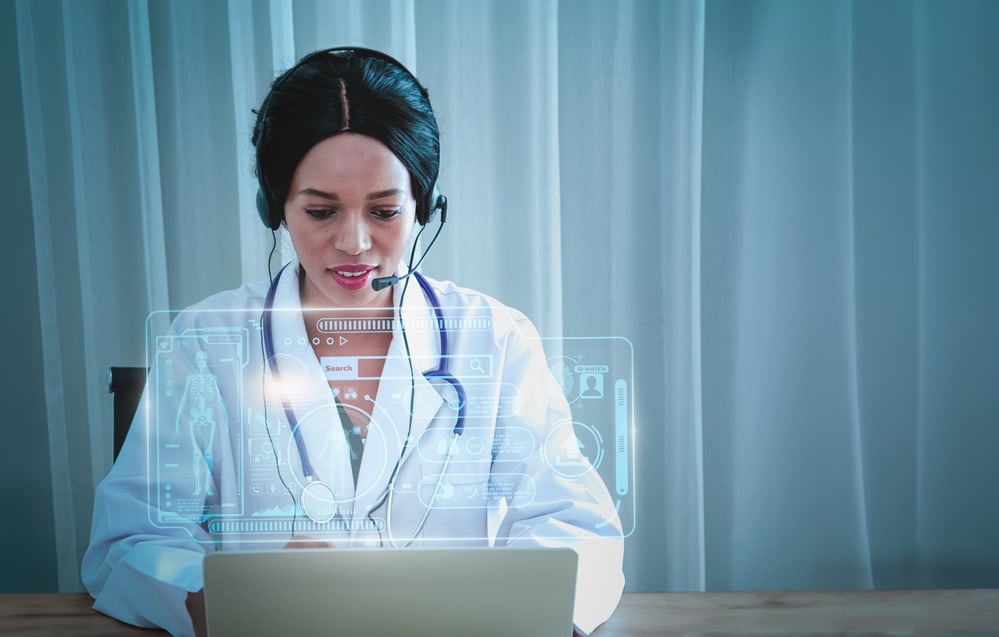During the past few years, telemedicine has expanded significantly. There are a lot of people who enjoy the ability to visit a doctor remotely. Many people do not want to expose themselves to others in the waiting room.
Some people are concerned about patient privacy when they go to the doctor’s office and spend time in the waiting room. Although this mode of medical services is significantly efficient, it also comes with its own risks.
All telehealth and telemedicine providers need to think about telehealth cybersecurity provisions. What do they need to know about, and what are some of the best practices they must follow?
Learn about the critical role of cybersecurity in telehealth and how you can strengthen your posture against cyber attacks.
Key Takeaways
2. Telehealth cybersecurity is the responsibility of every healthcare provider to protect sensitive information.
3.PatientCalls is a HIPAA-compliant call answering service dedicated to healthcare organizations.
Cybercrime Is On the Rise in Healthcare
Because telehealth or remote patient monitoring has become more popular, it has become a target among hackers. As a visit is conducted digitally, patients must submit their personal health information online.
This could include their financial information, a popular target for hackers and cybercriminals. Unfortunately, cybercrime attacks executed on telemedicine providers have risen significantly during the past few years.
In November 2023, a ransomware attack was reported to have hit a healthcare institution operating more than 30 hospitals. The attack exposed thousands of patient data and forced every hospital to deal with the affected patient information manually.
News on telehealth cybersecurity predicts that more similar cases will likely arise in the coming years. This statement puts telehealth services on their toes and forces them to strengthen remote patient monitoring cybersecurity controls.

The Critical Role of Telehealth Cybersecurity
Telehealth industries are more likely to be targeted by cyberattacks and security concerns. Their dependency on technology for storing and processing patient information makes them vulnerable and a hot target.
Every telehealth service must establish a comprehensive cybersecurity system to continue serving safe remote services.
In particular, here are some of the critical roles of cybersecurity in delivering safe telehealth services:
- Protection of patient data. The main business of telehealth services involves handling sensitive patient information. This includes the transmission of data from one department to another. Cybersecurity is critical in preventing unauthorized access, data breaches, and information theft.
- Compliance with regulations. In accordance with protecting data under digital services, government organizations have established laws on data privacy. Laws like the HIPAA and GDPR mandate strict standards to protect patient data.
- Proactive system for preventing cyberattacks. Cybersecurity controls help proactively prevent cyberattacks from occurring. Setting up firewalls, data encryption, and detection systems makes an organization less likely to be targeted.
- Maintaining trust and confidentiality. Having a comprehensive cybersecurity system allows patients to put their trust in your organization. It ensures that their information is well-kept and free from unauthorized use.
- Ensuring continuity of care. Cyberattacks put patients’ information in danger and disrupt medical services. When cyberattacks occur, a healthcare organization pauses its services to address potential breaches. By safeguarding telehealth systems against cyber threats, healthcare organizations can ensure uninterrupted patient care access.
In today’s climate, telehealth has become an indispensable part of healthcare. It allows consumers to have greater access to healthcare services without disrupting their busy schedules.
A healthcare organization providing telemedicine is responsible for establishing a comprehensive cybersecurity system. Threats and risks cannot outweigh telehealth benefits.
By prioritizing cybersecurity, healthcare organizations can reap the benefits of telehealth while mitigating the associated risks.
Privacy Risks of Telehealth Services
Telehealth services do not come without any risks. When unmanaged and unprotected, they pose several privacy risks to the organization and the data it handles.
Here are some key privacy risks and concerns associated with telehealth services:
- Unauthorized access to sensitive data. Data are particularly vulnerable when transmitted from one source to another. This problem becomes even bigger when a third party handles data. Without adequate encryption and security measures, there is a risk of unauthorized access to patient data by hackers or other malicious actors.
- Inadequate authentication. Healthcare services with weak authentication systems can result in unauthorized access to data. This problem can compromise records and data security.
- Lack of secure communication channels. Some telehealth services work in their homes. Remote working opens communication lines to vulnerabilities. An unsecured internet connection can put patient information in unfavorable circumstances.
- Patient consent control. Patients must have control over their personal health information and consent to how it is collected, used, and shared during telehealth consultations. In some cases, other information that is not health-related also gets transmitted through the communication channels. An example is during remote such as the location of the patient. Consent must clearly state which information is being processed to secure privacy.
- Data retention and disposal. As much as data retention poses a great risk, their disposal also requires careful handling. Disposal is required if a patient requests it or if potential data breaches have been detected. Failure to adequately manage data retention and disposal can increase the risk of unauthorized access or disclosure of patient information.
- Control of devices used to store information. Sometimes, healthcare services allow the BYOD system or bring-your-own-device. Although convenient, this setup poses a higher risk of data information misuse and privacy and security concerns. It requires strict policies for control.
Healthcare organizations offering telehealth services can only provide high-quality care if they are secured from risks and threats. Setting up controls for cybersecurity requires a multi-factor approach by the entire organization.
By prioritizing patient privacy and implementing appropriate safeguards, telehealth providers can mitigate privacy risks and build trust with patients.
HIPAA Still Applies To Telemedicine
Even though patient care might be handled remotely, HIPAA regulations still apply. Everyone needs to make sure they use a platform that is HIPAA-compliant. Some of the most important points that healthcare organizations need to keep in mind include:
- Only authorized users and healthcare providers should have access to electronic protected health information, typically called ePHI.
- There must be a secure communication system in place. That means that communications that take place digitally between patients and providers must be protected accordingly. This means that email, Skype, and SMS should not be used for communicating PHI at a distance.
- Clear records of patient data and communication must be comprehensively documented and monitored.
- There should also be an audit system in place. That means there should be records of who is accessing what documents and when.
- A system should also be in place that automatically logs off the computer when left idle for a few minutes.
Following these guidelines is important for making sure providers adequately protect patient information. This can also shield organizations from potential regulatory sanctions.

Tips for Reducing Risk in Telemedicine Cybersecurity
There are several tips that all medical providers need to follow if they are providing care remotely. Some of the most important tips include:
1. Limit Access to the Network
First, medical providers must limit access to the network. This means that not everyone needs to have access to everything. Instead, they need to take advantage of granular permissions. This means that people should only have access to the documents required to do their jobs.
This is not reflective of a lack of trust. Instead, it simply means that if someone steals their login credentials, they don’t get access to everything. They only get access to a few documents.
2. Encrypt Information
Typically, information is encrypted at its origin and destination. It is not necessarily encrypted in transit. With telemedicine, many confidential documents are passed back and forth through mobile devices. Invest in a network solution that will make sure that your documents are encrypted from start to finish.
3. Use Multi-Factor Authentication
Telemedicine providers should also take advantage of multi-factor authentication. This means accessing files should take more than a simple username and password combination. Instead, there should be a second factor in place.
For example, a set of login credentials should be paired with a text message verification code. That way, they cannot access the network if someone steals a username and password.
4. Audit All Documents Regularly
Finally, it is helpful to audit all documents regularly. That means medical professionals must look closely at the documents occasionally and see who is accessing them. If there is unauthorized access taking place, this has to be investigated.
By auditing documents from time to time, it is possible to catch hackers before they can cause serious damage.
5. Perform security training
All healthcare providers and telehealth services employee must undergo comprehensive training to understand telehealth benefits, risks, threats, and security controls. All employees handling data must know how important it is to preserve protection.
Conduct training programs and refresher courses for employees.
Rely on PatientCalls for Help With Telemedicine and Telehealth
Even though telehealth is a field primed to grow during the next few years, it is important to ensure that all confidential information is protected. If you are a business looking into outsourcing your medical services, particularly in line with telemedicine, you need a certified organization like PatientCalls.
We are PatientCalls, and we provide various administrative services for doctors’ offices. It would be our pleasure to work with you as well. Our telehealth services are HIPAA-compliant, so you do not have to worry about complying with strict regulations.
Contact us today to learn how we can help you with your telemedicine solution.







